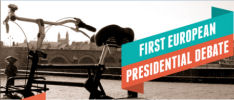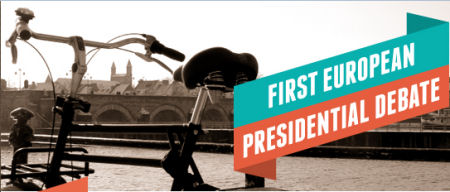First ever European Presidential Debate hopes to reinvigorate youth vote
 With less than one week to go until the First ever European Presidential Debate broadcast live on Euronews, hosted by the City of Maastricht, Maastricht University, Connect Limburg and the European Youth Forum, the format and themes of the debate have been announced. The debate will see the candidates for the presidency of the European Commission battle out key issues on the future of Europe. With its focus on youth issues, it is hoped that the debate will ignite young people's interest in the European elections and encourage them to vote.
With less than one week to go until the First ever European Presidential Debate broadcast live on Euronews, hosted by the City of Maastricht, Maastricht University, Connect Limburg and the European Youth Forum, the format and themes of the debate have been announced. The debate will see the candidates for the presidency of the European Commission battle out key issues on the future of Europe. With its focus on youth issues, it is hoped that the debate will ignite young people's interest in the European elections and encourage them to vote.
 Maastricht, Wednesday 23 April 2014 -- In front of an audience of 700 young people, the candidates, Jean-Claude Juncker (European People's Party), Martin Schulz (Party of European Socialists), Guy Verhofstadt (Alliance of Liberals and Democrats for Europe Party), and Ska Keller (European Green Party) will answer questions that have been gathered from thousands of young people from all over Europe. The candidates will then debate key issues such as foreign policy, the future of the EU, and youth employment.
Maastricht, Wednesday 23 April 2014 -- In front of an audience of 700 young people, the candidates, Jean-Claude Juncker (European People's Party), Martin Schulz (Party of European Socialists), Guy Verhofstadt (Alliance of Liberals and Democrats for Europe Party), and Ska Keller (European Green Party) will answer questions that have been gathered from thousands of young people from all over Europe. The candidates will then debate key issues such as foreign policy, the future of the EU, and youth employment.
Moderated by Euronews lead presenters Isabelle Kumar and Chris Burns, the debate will be available live through Euronews' worldwide TV network (covering 415 million homes in 156 countries), simultaneously in 13 languages. The debate will also be broadcast live on Euronews radio and streamed live on http://www.eudebate2014.eu, on www.euronews.com and on Euronews' mobile apps.
The debate will focus on three main themes: the European economy - crisis and growth; the future of Europe and rise of Euroscepticism; and Europe's foreign policy role. Pre-selected members of the audience will ask questions directly to the candidates. Questions can be still be posed to the candidates in the run-up to and during the debate, via Twitter, using #EUdebate2014. Social media moderators will be monitoring Twitter activity and will select popular questions to pose to the candidates during the debate.
This debate is unique both because it is the first time that all the main candidates for the Commission Presidency will meet for a televised debate, but also because of its focus on youth, which gives it a unique perspective and importance in the run up to the European elections.
Turnout in elections is decreasing across Europe, and European elections are even more vulnerable to this trend. In most EU countries, young people are the age group most likely not to vote (67% of 18-24 year olds in the 2004 European Parliament elections, and 71% in 2009). Two key factors explain this. First, the European institutions are often perceived as distant and are blamed for unpopular measures. Secondly, many young people do not understand the role of the European Parliament and consider voting not to be worthwhile. Furthermore, young people perceive that European politicians do not address the issues that they care about and so they do not vote.
However, a TV debate can help shift this trend and help to engage young people in the elections. According to research by the Reuters Institute for the Study of Journalism, the three televised debates between party leaders in the UK in 2010 successfully attracted first-time voters and those not interested in politics.
Young people have been involved in the conceptualisation, planning and hosting of the debate. Thousands of young people across Europe were invited to submit questions for the debate, through their universities (in every EU Member State), as well as through the League of Young Voters.
Events to broadcast the debate are being hosted all over the world, including an event in Brussels, hosted by Burson Marsteller, where the debate will be analysed by an audience of opinion-formers and policy makers.

Recent comments